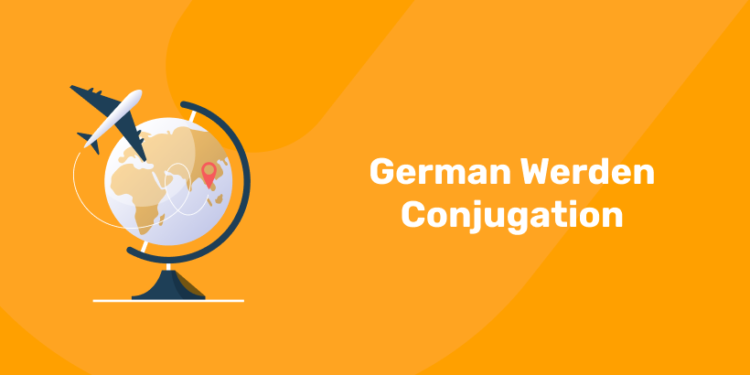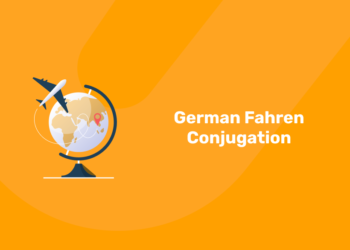Table of Contents
Introduction
The German language is complex and rich with verbs that can change form and meaning depending on how they are used. One of those verbs is “werden” which is crucial for future actions, transformations and passive voice constructions. Conjugating “werden” is key to mastering German. In this post we will go into detail about the German Werden Conjugation, its meanings, tenses and everyday usage.
What does “Werden” mean?
1: How do you say "Good Morning" in German?
The verb “werden” translates to “to become” in English. It’s used to describe a change of state or condition, so it’s very versatile. For example “Ich werde müde” means “I am becoming tired”. “Werden” is also used to form the future tense and the passive voice in German which adds another layer of complexity to its conjugation.
Conjugating “Werden” in the Present Tense
In the present tense “werden” is conjugated like this:
- ich werde (I become)
- du wirst (you become – informal singular)
- er/sie/es wird (he/she/it becomes)
- wir werden (we become)
- ihr werdet (you become – informal plural)
- sie/Sie werden (they/you become – formal)
Examples:
- Ich werde Arzt. (I am becoming a doctor.)
- Du wirst müde. (You are becoming tired.)
- Wir werden Freunde. (We are becoming friends.)
Conjugating “Werden” in the Simple Past (Präteritum)
The simple past tense, or Präteritum, is used in written German. The conjugation of “werden” in this tense is:
- ich wurde (I became)
- du wurdest (you became – informal singular)
- er/sie/es wurde (he/she/it became)
- wir wurden (we became)
- ihr wurdet (you became – informal plural)
- sie/Sie wurden (they/you became – formal)
Examples:
- Ich wurde müde. (I became tired.)
- Sie wurde Lehrerin. (She became a teacher.)
- Wir wurden Freunde. (We became friends.)
Conjugating “Werden” in the Perfect Tense (Perfekt)
The perfect tense is formed with the auxiliary verb “haben” and the past participle “geworden”. Here’s how to conjugate “werden” in the perfect tense:
- ich bin geworden (I have become)
- du bist geworden (you have become – informal singular)
- er/sie/es ist geworden (he/she/it has become)
- wir sind geworden (we have become)
- ihr seid geworden (you have become – informal plural)
- sie/Sie sind geworden (they/you have become – formal)
Example:
- Ich bin müde geworden. (I have become tired.)
- Wir wurden Freunde. (We have become friends.)
- Sie wurde Lehrerin. (She became a teacher.)
Werden in the Future Tense
To express future actions in German, “werden” is used as an auxiliary verb. You use “werden” with the infinitive of the main verb.
Examples:
- Ich werde morgen arbeiten. (I will work tomorrow.)
- Wir werden nächste Woche reisen. (We will travel next week.)
- Sie wird bald ankommen. (She will arrive soon.)
Conditional and Subjunctive Forms of Werden
Conditional (Konjunktiv II)
In the conditional form, “werden” expresses hypotheticals or wishes.
- ich würde (I would become)
- du würdest (you would become)
- er/sie/es würde (he/she/it would become)
- wir würden (we would become)
- ihr würdet (you would become)
- sie/Sie würden (they/you would become)
Examples:
- Ich würde Arzt werden. (I would become a doctor.)
- Wenn ich Zeit hätte, würde ich reisen. (If I had time, I would travel.)
Werden in Passive Voice
Werden is used to form the passive voice in German. You use werden with the past participle of the main verb.
Examples:
- Die Aufgabe wird gemacht. (The task is being done.)
- Das Buch wird gelesen. (The book is being read.)
- Die Prüfung wird bestanden. (The exam is being passed.)
Phrases and Idioms with Werden
- Es wird Zeit. (It’s time.)
- Was wird sein, wird sein. (What will be, will be.)
- Das wird schon. (It will be fine.)
Practice Exercises to Practice “Werden” Conjugation
To practice the conjugation of “werden”, try these exercises:
Exercise 1: Fill in the Blanks
- Ich __ (werden) müde.
- Du __ (werden) Arzt.
- Wir __ (werden) Freunde.
Exercise 2: Conjugate the following sentences
- Sie __ (werden) glücklich.
- Ihr __ (werden) morgen kommen.
- Er __ (werden) ein Lehrer.
Exercise 3: Passive Voice
- Der Kuchen __ (werden) gegessen.
- Die Stadt __ (werden) besucht.
- Das Bild __ (werden) gemalt.
Conclusion
The German Werden Conjugation is a basic part of the language that gives you access to many expressions, from future tense to passive constructions. Master “werden” and you’ll improve your German speaking and writing skills and be able to communicate in many situations.
Want to learn more German? Enroll in the Entri German Language Course. With expert teachers, interactive lessons and a structured curriculum you can level up your language skills.
Explore your options at Entri German Language Course and start your journey toward fluency today!
Frequently Asked Questions
What is the significance of the verb "werden" in German?
The verb “werden” is one of the most important verbs in the German language. It serves multiple functions, including indicating transformation (e.g., “Ich werde müde” – “I am becoming tired”), forming the future tense (e.g., “Ich werde arbeiten” – “I will work”), and creating the passive voice (e.g., “Das Buch wird gelesen” – “The book is being read”). Mastering “werden” is crucial for effective communication in various contexts.
How do you conjugate "werden" in the present tense?
In the present tense, “werden” is conjugated as follows:
- ich werde (I become)
- du wirst (you become – informal singular)
- er/sie/es wird (he/she/it becomes)
- wir werden (we become)
- ihr werdet (you become – informal plural)
- sie/Sie werden (they/you become – formal)
Understanding these forms allows you to express current actions and states effectively.
What are the conjugations of "werden" in the simple past tense?
In the simple past tense (Präteritum), “werden” is conjugated as follows:
- ich wurde (I became)
- du wurdest (you became – informal singular)
- er/sie/es wurde (he/she/it became)
- wir wurden (we became)
- ihr wurdet (you became – informal plural)
- sie/Sie wurden (they/you became – formal)
This tense is primarily used in written German, especially in narratives and formal contexts.
How is "werden" used in the perfect tense?
In the perfect tense (Perfekt), “werden” is combined with the auxiliary verb “sein” and the past participle “geworden.” The conjugation is as follows:
- ich bin geworden (I have become)
- du bist geworden (you have become – informal singular)
- er/sie/es ist geworden (he/she/it has become)
- wir sind geworden (we have become)
- ihr seid geworden (you have become – informal plural)
- sie/Sie sind geworden (they/you have become – formal)
This construction is used to describe completed actions and is common in spoken German.
What role does "werden" play in forming the future tense?
“Werden” is used as an auxiliary verb to form the future tense in German. The structure involves using “werden” followed by the infinitive form of the main verb. For example:
- Ich werde lernen. (I will learn.)
- Du wirst kommen. (You will come.)
This construction allows speakers to indicate plans or events that will occur in the future.
How do you express hypothetical situations using "werden"?
Hypothetical situations in German are expressed using the conditional form (Konjunktiv II) of “werden.” The conjugation is:
- ich würde (I would become)
- du würdest (you would become)
- er/sie/es würde (he/she/it would become)
- wir würden (we would become)
- ihr würdet (you would become)
- sie/Sie würden (they/you would become)
For example, “Ich würde Arzt werden” means “I would become a doctor.” This form is often used to express wishes, suggestions, or unreal situations.
What is the importance of "werden" in passive voice constructions?
“Werden” is essential for forming the passive voice in German. The structure involves combining “werden” with the past participle of the main verb. For example:
- Die Aufgabe wird gemacht. (The task is being done.)
- Das Buch wird gelesen. (The book is being read.)
Using “werden” in this way allows the focus to shift from the doer of the action to the action itself, which is a critical aspect of German syntax.
Can you provide examples of common idiomatic expressions using "werden"?
Certainly! Here are a few idiomatic expressions that include “werden”:
- Es wird Zeit. – “It’s time.”
- Was wird sein, wird sein. – “What will be, will be.”
- Das wird schon. – “It will be fine.”
These expressions reflect common sentiments and are useful in everyday conversations.
How can I practice the conjugation of "werden"?
To practice the conjugation of “werden,” you can engage in various exercises such as:
- Fill-in-the-blank sentences where you conjugate “werden” based on context.
- Writing sentences in different tenses using “werden.”
- Speaking prompts that require you to use “werden” in conversation.
Additionally, online resources and language learning apps, like the Entri German Language Course, offer structured exercises for practice.
How does understanding "werden" help in mastering the German language?
Understanding “werden” is crucial for mastering the German language because it is a fundamental verb that appears frequently in both spoken and written contexts. It helps learners express future actions, describe changes, and form the passive voice. By mastering “werden,” you lay a solid foundation for more advanced grammatical structures and improve your overall fluency in German. For comprehensive learning, consider enrolling in the Entri German Language Course, which provides in-depth lessons and practice opportunities tailored to your learning needs.










